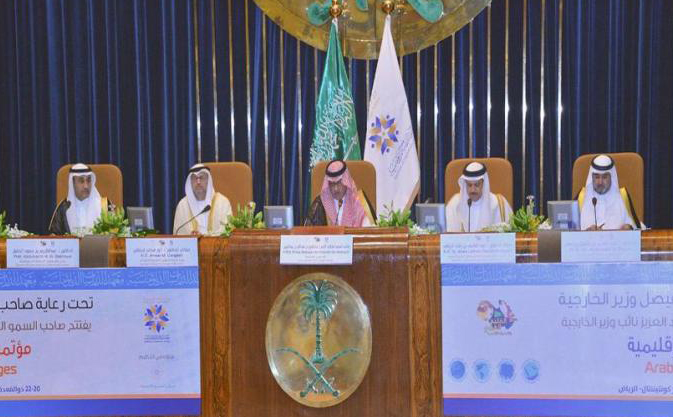ID :
341544
Wed, 09/17/2014 - 09:39
Auther :
Shortlink :
https://oananews.org//node/341544
The shortlink copeid
GCC plays instrumental role in regional stability, says Gargash

RIYADH: 'The Conference of the Arabian Gulf and Regional Challenges' organised by the Institute of Diplomatic Studies, in collaboration with the Gulf Research Centre in Dubai opened yesterday at the Intercontinental Hotel in Riyadh.
In the opening remarks, Prince Abdulaziz bin Abdullah bin Abdulaziz, Deputy Minister of Foreign Affairs, called for addressing the risks and challenges that surround the Arab Gulf States and follow a multi-faceted response to confront them.
He also called for regional and international cooperation to contain the explosive conflicts and address the phenomenon of terrorism which has become a major threat to the stability and security of the international community which requires concerted international efforts to combat this dangerous phenomenon and fortify the internal front in our countries in the face of these dangers in neighbouring countries.
U.A.E. Minister of State for Foreign Affairs Dr. Anwar Mohammed Gargash delivered a speech on the GCC and regional changes, in which he said the GCC had been playing a pivotal role in regional security and stability.
He underscored the so-called extremist political Islam as one of the major challenges facing the region's security, as well as economic and social welfare. Other challenges, he added, include, trans-border crime and terrorism.
Dr. Gargash said in order to confront such challenges, particularly the terrorism, the U.A.E. established the Centre for Countering Violent Extremism (Hedayah) to serve as the premier international institution for training, dialogue, collaboration, and research to counter violent extremism in all of its forms and manifestations.
The U.A.E. also hosts the Muslim Council of Elders, the first independent international body that aims at promoting peace in Muslim societies. The country recently ratified a federal counter-terrorism law and is an active member in a number of regional and international counter-terrorism bodies.
Dr. Gargash warned that ISIL currently represents the most notorious terrorist group following its heinous crimes in Syria and Iraq.
"The U.A.E. believes that a clear and inclusive policy must be adopted to confront terrorism. Terrorism is not just represented by ISIL but also by many other organisations in our Arab region," he said.
He also commended the steps taken recently during the NATO summit in Wales and the ministerial meeting in Jeddah, describing them as a positive start to put an end to the inhumane acts of terror.
Dr. Gargash also referred to the complex situation in Yemen and the snowballing Houthi crisis and said some forces exploit the deteriorating security there to undermine political transition.
He said a host of challenges were posed at the GCC consensus, including religious extremism, sectarianism and ambitions by some regional powers which manifested in the Iranian occupation of the U.A.E.'s three islands of Abu Musa, Greater Tunb and Lesser Tunb.
Dr. Gargash renewed the call by the GCC countries to enforce the Treaty on the Non-Proliferation of Nuclear Weapons (NPT) and expressed the hope that the P5+1's upcoming talks with Iran would lead to tangible outcomes.
He also referred to the recent Israeli aggression against Gaza which led to killing of innocent civilians. He commended the role played by the Egyptian diplomacy and said a lasting peace was possible through a comprehensive two-state solution, based on the 1967 borders with Jerusalem as a capital for the Palestinian state.
Dr. Gargash said it is key for the GCC to stay away from Arab conflicts and polarisation and to refrain from intervention in others' affairs. – Emirates News Agency, WAM – http://www.wam.ae/en/news/arab-international/1395269723548.html





